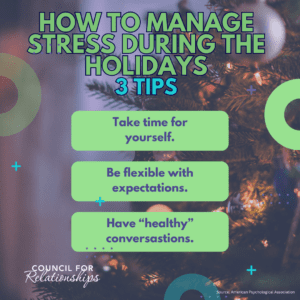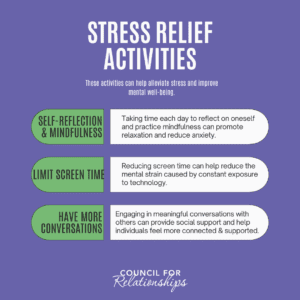How to Manage Stress During the Holidays
Ask any AI chatbot about how to manage stress during the holidays, and you’re bound to find out that there is a lot of stress management advice out there. Council for Relationships is here to clear a path through the clutter. We asked Matthew McCrickard, the Associate Director of CFR’s Postgraduate Certificate Program, for his top holiday stress management advice.
Everyone has opinions on how to manage stress during the holidays.
Holiday messages are once again monopolizing screens of all sizes and the various media we consume. Neighborhoods are adorned with colorful lights, sparkling candy canes, snowflakes, and myriad animated lawn characters. Once again, I scrolled through the annual stories about holiday stress and the platitudes and how-to guides about engaging Uncle So-and-so’s off-putting remarks during family gatherings.
There is a part of me that enjoys all of the holiday splendor, but admittedly, there is also a part that sometimes wants to say “Bah Humbug!” to the added stressors and mixed messages pervasive this time of year. In other words, I like the holiday decorations, but sometimes I feel stressed and confused during this time of year.
Manage stress during the holidays with confidence! Here’s how to do it.
Navigating complex relationships with extended family members during the holidays or at any time can evoke many different feelings. Some feelings can be uncomfortable, and we might avoid certain people or have repeated difficult interactions.
We all can try something new instead of reverting to the familiar. Research and experience show that reducing stress has countless mental and physical health benefits.
What if we invited ourselves to avoid the same old, uncomfortable, stress-filled patterns?
What if we took a few minutes daily to be kind to ourselves?
What if we learned to focus on our thoughts instead of the things that make us uncomfortable?
You do not need to make big changes or have a New Year’s resolution to answer these questions. Instead, you can start by regularly reflecting on yourself throughout the day. Small changes can lead to noticeable results.
A recent American Psychological Association (APA) study shows that stress is more common than we think. Over 60% of stressed people don’t talk about their stress and feel alone because they think others will not care to listen.
Self-care includes taking time for oneself, being flexible with expectations, and having “healthy conversations” to reduce stress. Self-care is important for reducing stress and maintaining well-being. It involves prioritizing one’s needs and making time for activities that bring joy and relaxation.
Being flexible with expectations means being open to adjusting plans and goals when necessary.
Having “healthy conversations” refers to engaging in positive and supportive communication with others. These conversations can help alleviate stress and promote emotional well-being.
These takeaways from the APA remind me that those who experience stress are not alone. Talking to a therapist and friends can help us. They want to know about our experiences and are ready to listen. Through these conversations, we can explore our feelings and how we want to appear in relationships.
How to use mindfulness to manage stress during the holidays.
Dr. Dan Seigel is a doctor, writer, and teacher at UCLA. He teaches people how to use mindfulness in their everyday lives. SSeigel wants us to breathe and approach our lives calmly, openly, and curiously.
I bought Seigel’s book Becoming Aware as a gift to myself this holiday season. It will help me start practicing mindfulness.
Much has been written about the effects of increasing screen time. Aya Hatano and her team studied the benefits of taking a daily short break from our devices. This break allows us to focus on our current tasks.
Some people enjoy staying busy throughout the day. However, many are unaware they can find happiness by simply focusing on their thoughts.
Self-reflection and mindfulness practices strengthen relationships with important people in our lives.
To reduce stress, experts recommend engaging in self-reflection and mindfulness daily, limiting screen time, and having more conversations. These activities can help alleviate stress and improve mental well-being. Taking time each day to reflect on oneself and practice mindfulness can promote relaxation and reduce anxiety.
Additionally, reducing screen time can help reduce the mental strain caused by constant exposure to technology.
Lastly, engaging in meaningful conversations with others can provide social support and help individuals feel more connected and supported.
We can use these activities anytime, not just during holidays. Seigel’s guides, mindfulness apps, and talking to a therapist can help us try new things.
Holiday stress invites us to reassess how we manage our mental health.
Recent research confirms that we do not have to follow the same patterns. Reducing stress helps us stay calm in tough situations. It also helps us have more understanding and kindness towards ourselves and others in our relationships.
Instead of ignoring my smart watch’s reminders, I will view them as opportunities. These reminders prompt me to stand up or take deep breaths. I see them as chances to check in with myself. I’ll use social media less to focus more on what I’m experiencing in those moments.
I am looking forward to trying something new and incorporating deeper conversations and more mindfulness into my daily experience.
Perhaps you will find these invitations to be helpful, too.
About the Author
Matthew McCrickard, Ed.D., is the Associate Director of Council for Relationships’ Postgraduate Certificate Program. Visit his bio page to ask about this blog on how to manage stress during the holidays or the Postgraduate Certificate Program.
See our Therapist & Psychiatrist Directory to find a different CFR therapist or psychiatrist near you.
More from CFR
If you liked this blog on how to manage stress during the holidays, check out more great tips, tricks, and resources from Council for Relationships clinicians!



